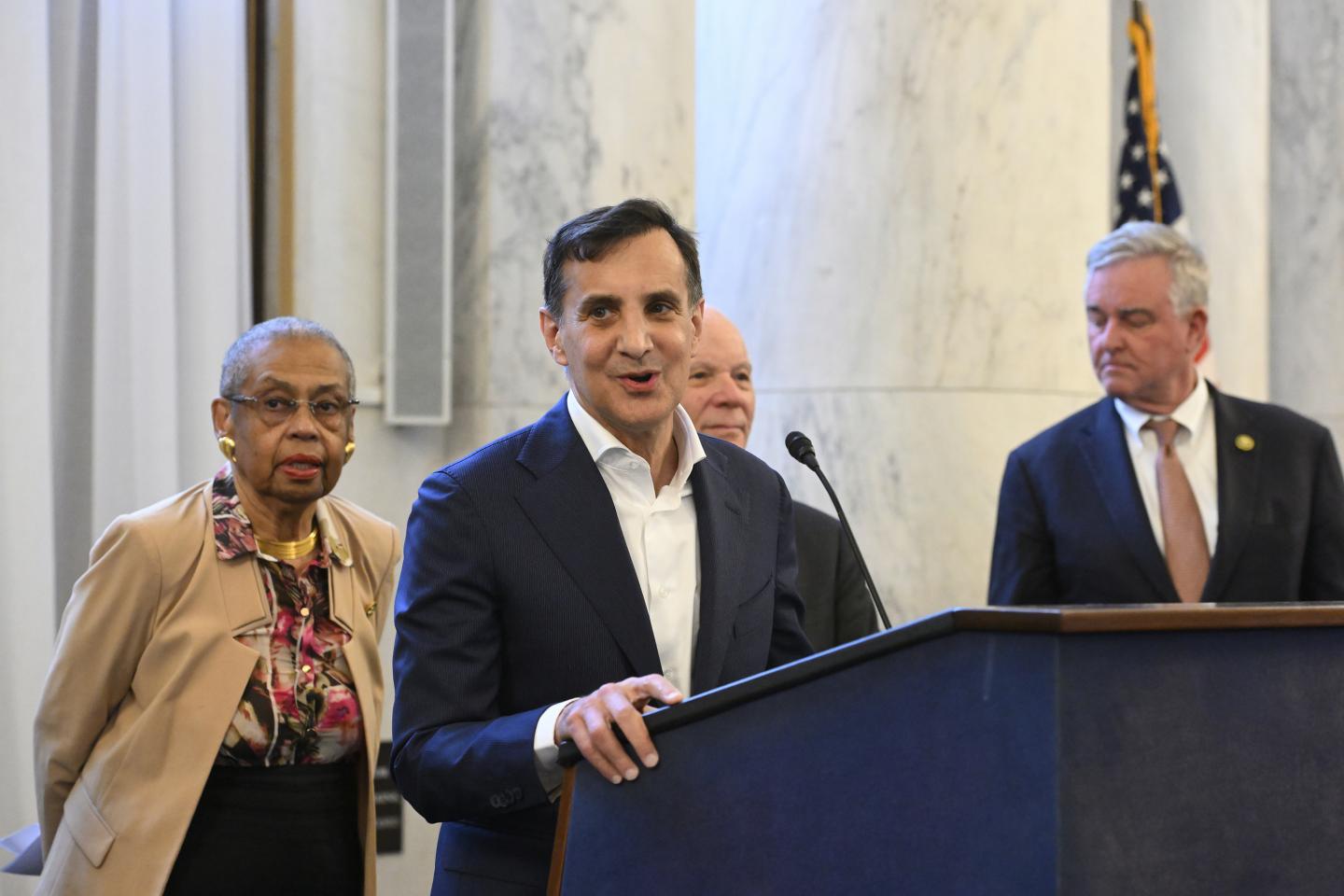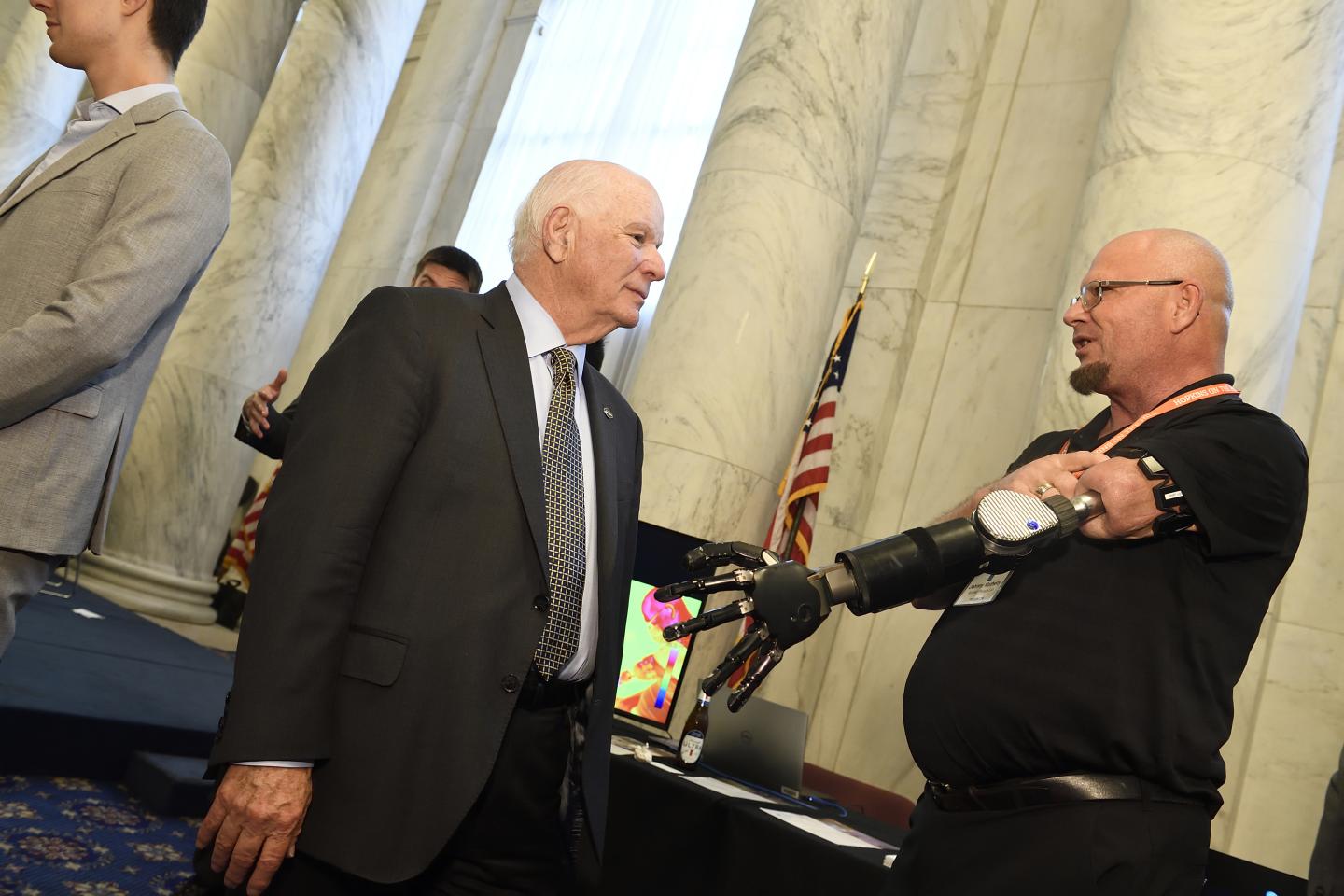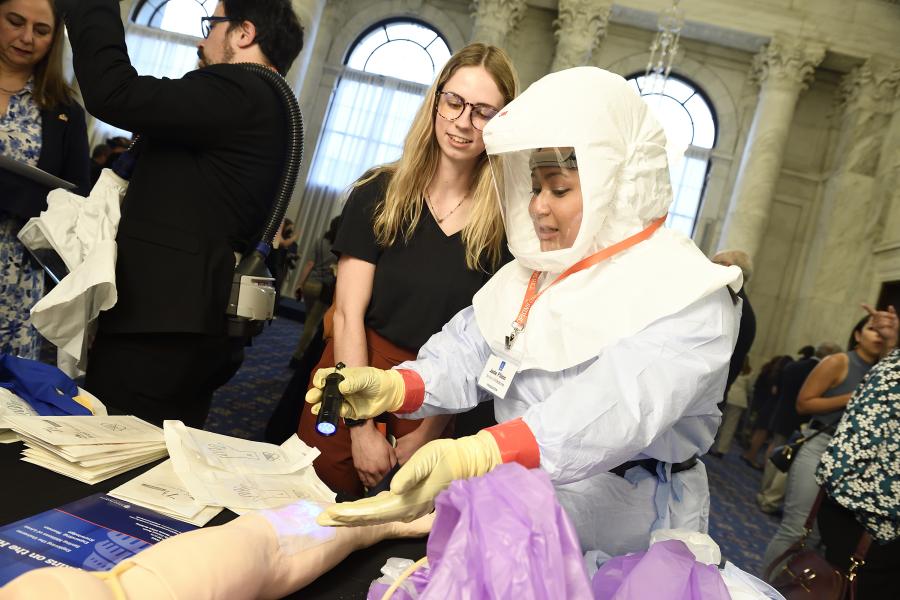More than 500 delegates, legislators, congressional staffers, and representatives from government agencies gathered after work on June 7 to see firsthand a slice of the federally funded research and programming at Johns Hopkins University.
The biennial event, Hopkins on the Hill, took place at the historic Kennedy Caucus Room of the Russell Senate Office Building on Capitol Hill. Government officials mingled with scientists and meandered among various informative displays, from the rotorcraft-lander, Dragonfly, set to explore Saturn's largest moon, to the telehealth app CurieDx, which can diagnose strep throat and a urinary tract infection with a mere selfie.
Video credit: Aubrey Morse / Johns Hopkins University
Attendees could touch a model version of Dragonfly and shake hands with Johnny Matheny, who lost his arm to cancer and wears what is considered the world's most advanced modular prosthetic limb, developed by the Applied Physics Laboratory and School of Medicine. They could see Jhpiego's needleless, WHO-approved vaccine injection, Tropis, designed to save time and money and boost vaccine compliance rates in Nigeria. They could explore the School of Education's efforts to make schools safe and healthy in the post-pandemic era; the Krieger School's work to make Baltimore a world leader in equitable solutions to climate challenges; and the Bloomberg School of Public Health's evidence-based solutions to gun violence.
"As you walk around the room, you will get some sense of the breadth and depth of the research going on all across all nine schools at Hopkins," said JHU President Ron Daniels in his opening remarks. Daniels went on describe his view, as a native Canadian, of the interplay between academia and the government: "As a Canadian, before moving to the United States, we were simply in awe of the connection that existed between the federal government and the American academy—and the extent to which … rather than having the federal government set up independent labs detached from the great research universities of the United States, the great opportunity, the great frontier was to actually link the university with the federal government.
"For those of us who come from outside of this country, the sheer genius of that [relationship] is something that fills you with awe," Daniels added.

Image credit: Will Kirk / Johns Hopkins University
Denis Wirtz, who grew up and attended school in Belgium and is now the vice provost for research at JHU and an expert in the molecular and biophysical mechanisms of cell motility, agrees. "There are many aspects of the American university that remain the envy of the world, and with Hopkins being by far the largest recipient of federal funding, we have a special duty to address the needs of the nation, and we take that commitment seriously," Wirtz said.
Johns Hopkins University's history of research harkens back to its founding, in 1876, when it became the first academic institution in the United States to implement graduate research and training. Since 1979, the school has annually led the nation in research and development expenditures, spending roughly $3.2 billion on R&D in 2021 alone, according to data from the National Science Foundation. This amount is almost double that of the second-ranked school in R&D, the University of California, San Francisco, which spent approximately $1.7 billion in 2021.

Image caption: U.S. Sen. Ben Cardin talks with Johnny Matheny
Image credit: Will Kirk / Johns Hopkins University
"Every penny [of the federal money Hopkins receives] is fought for with sweat and tears, and underneath that visible part of the iceberg is a lot of rejections," Wirtz said, referring to the highly competitive process of applying for and receiving a federal grant. "We compete in an open field, with every university getting the same opportunity."
Putting Hopkins' researchers at an advantage, Wirtz believes, are the funds supplied by the university to support intellectual and scientific exploration and development. "Hopkins is unique in that it spends roughly $5 million a year of its own money to encourage faculty to follow their instincts and curiosities," he explained. "Think of it as venture capitalism: The university takes a risk by funding ideas that may or may not pan out, but that risk puts faculty in the position to test their ideas, get the necessary data, and ultimately compete to achieve federal funding."
Although many of the displays and exhibits at Hopkins on the Hill involve complex science and technology, researchers spent the night breaking down these complexities for general audiences. "It was like a giant adult science fair, but we didn't talk jargon or give poster presentations," said Kristen Reek, the associate director of federal strategy who helped plan the event. Instead, the evening involved making "science accessible to all and demonstrating how our work breaks barriers, helps people, and makes the world a better place."
For Wirtz, the event embodies the sea change that has occurred in academia in recent years, with universities and colleges—especially JHU—moving away from notions of higher education as something removed from everyday life. "Hopkins is not and never has been an Ivory Tower," he said. "It might be a private institution, but it's an urban campus and a university in the work of public service."
With the crowd abuzz last night over the upcoming opening of Hopkins' new state-of-the-art building at 555 Pennsylvania Ave. in Washington, D.C., connections between the university, the government, public policy, and the needs of the nation will only grow stronger.
"The building will open unofficially in four weeks, representing an important milestone in the history of the university, as Hopkins becomes more intentional about public policy," Daniels said in his remarks.
Situated in the heart of the nation's capital, Johns Hopkins will only increase its role as a preeminent "source of truthful information to policymakers and problem solvers for the people of both the country and world," Wirtz said.








